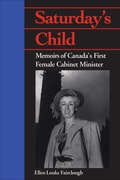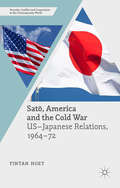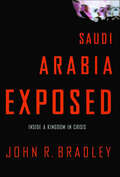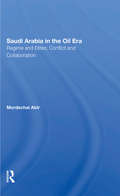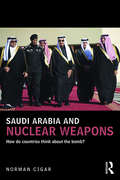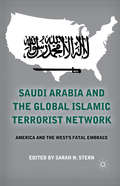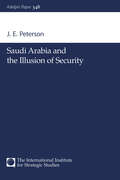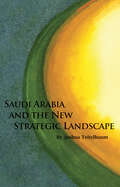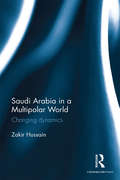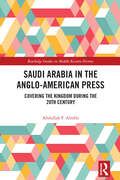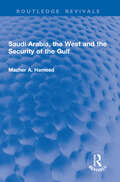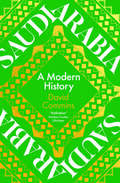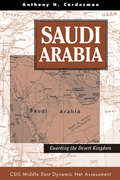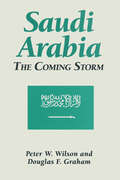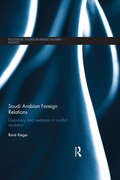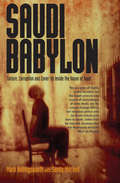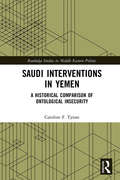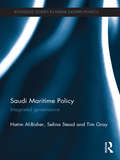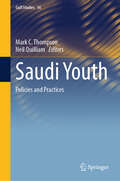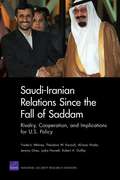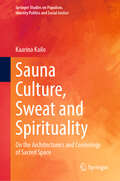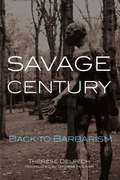- Table View
- List View
Saturday Bloody Saturday
by Alastair Campbell Paul FletcherFebruary 1974. Football manager Charlie Gordon is struggling, and with each defeat the sack gets closer. His greatness as a player counts for nothing with directors or fans, or the Number 2 who is after his job. Things are no better off the field, and after a failed marriage and the loss of a child, he is taking more and more consolation in alcohol.Only a decent Cup run is keeping him in work. But how to turn things around with the same players who got him here in the first place? Can he trust this remarkable but often unreliable mix of characters to save him? Footballers fall into two categories - artists or assassins. With the next round of the Cup at Chelsea away he will soon find out which of his players, from homesick teenage starlet Willie Buchanan, to playboy record signing DD Marland, can deliver for him.Meanwhile, as the country prepares for a general election, one of the most audacious and high-profile political assassinations in the IRA's history is being planned in London. An active service unit of two men and a woman await the critical signal to proceed. Now both teams - the IRA's and Charlie's - converge on the capital for a result that will alter everyone's lives irrevocably, with consequences far beyond football.Read by Jonathan Keeble(p) Orion Publishing Group 2018
Saturday's Child: Memoirs of Canada's First Female Cabinet Minister
by Margaret Conrad Ellen Louks FaircloughEllen Fairclough is perhaps best known as the first woman in Canada to become a federal cabinet minister. John Diefenbaker appointed her Secretary of State in 1957. In the course of her career she also served as Minister of Citizenship and Immigration and Minister responsible for Indian Affairs, and was in charge of the National Gallery, the National Film Board, the Dominion Archives, and the National Library. She was also a chartered accountant, a business woman, a local politician in Hamilton, and a wife and mother. At a time when many people believed that a woman's place was in the home, she successfully balanced family obligations with a career in the largely male world of federal politics. Writing with the style and wit for which she was famous as a politician, Ellen Fairclough, now ninety, tells her story. Her reminiscences describe her early life, her efforts to become a business woman, and her experiences as a Progressive Conservative member for the constituency of Hamilton West (1950-63). Fairclough discusses the political factors that led to her appointment to the Diefenbaker cabinet, as well as other factors, including family values and the opportunities available in the bustling industrial city of Hamilton, that served as the context for her successes. While her story focuses on the politics involved, Fairclough also writes extensively about family life, friendships, and domestic detail. She attributes her success to the fact that she was a 'Saturday's child' who worked hard for what she achieved. The source of much media attention during her political career, Ellen Fairclough was often the only woman in a room full of men and, on one occasion, was asked to leave a cabinet meeting because the topic of discussion – sexual assault – might be too rough for her sensitive ears. Having no female role models to follow, Fairclough made her own rules and charted her own course. These memoirs make a fascinating contribution to the history of women and politics in this country.
Satō, America and the Cold War: US-Japanese Relations, 1964–72 (Security, Conflict and Cooperation in the Contemporary World)
by Fintan HoeyUsing recently released archival material from the US and Japan, this book critically re-examines US–Japanese relations during the tenure of Satō Eisaku, Japan’s longest serving prime minister. During these critical years in the Cold War in Asia, with the Vietnam War raging and the acquisition by China of a nuclear capability, Satō closely aligned with the US. This directly contributed to his success in securing the reversion of Okinawa and other Japanese territories which had remained under US control since Japan’s surrender at the end of World War II. To accomplish this he was also forced to conclude secret agreements with President Richard Nixon, including one on nuclear weapons, which are explored fully. Satō faced the challenge of the Nixon administration’s attempts to shore up the relative decline in American power with policies at odds with allied interests. Satō successfully overcame such challenges and also laid the groundwork for Japan’s anti-nuclear policy.
Saudi Arabia Exposed: Inside a Kingdom in Crisis
by John R. BradleySaudi Arabia: land of oil, terrorism, Islamic fundamentalism, and a crucial American ally. As the only Western journalist to have extensively worked in the Saudi Kingdom, John R. Bradley is uniquely able to expose the turmoil that is shaking the House of Saud to its foundations. From the heart of the secretive Islamic kingdom's urban centers to its most remote mountainous terrain, from the homes of royalty to the slums of its poorest inhabitants, he provides intimate details and reveals underlying regional, religious, and tribal rivalries. Bradley highlights tensions generated by social change, focuses on the educational system, the increasing restlessness of Saudi youth faced with limited opportunities for cultural and political expression, and the predicament of Saudi women seeking opportunities but facing constraints. What are the implications for the Sauds and the West? This book offers a startling look at the present predicament and a troubling view of the future.
Saudi Arabia In The Oil Era: Regime And Elites; Conflict And Collaboration (Routledge Library Editions: Saudi Arabia Ser. #5)
by Mordechai AbirWhen I began a survey of source material for this book in the early 1980s, I was somewhat surprised by the paucity of sources relating to socio-political dynamics in modem Saudi Arabia both in European languages and Arabic. Thus, William Rugh's article 'Emergence of a New Middle Class in Saudi Arabia' (1973), for instance, remains a classic to this day. In the field of social anthropology I found only a handful of serious studies of the Saudi population produced by western and Arab scholars (Katakura, Lancaster, Cole, Shamekh, and :tfamzah's outdated work). Other sources in Arabic largely dealt with the kingdom's geography and tribal division, past history to the twentieth century, the reign of Abd al-Aziz ibn Saud, and the rise of the Wahhabi movement and its impact on the Arabian Peninsula. The contribution of Saudi scholars of good standing to the subject was minimal, as the Saudi modem elites were beginning to emerge in the middle of the century and only lately have they begun to publish worthwhile scholarly studies of their society and government - studies inhibited, unfortunately, by the character of the regime and its strict censorship laws.
Saudi Arabia and Nuclear Weapons: How do countries think about the bomb? (UCLA Center for Middle East Development (CMED) series)
by Norman CigarNuclear proliferation in the Middle East remains an issue of concern. Saudi Arabia’s actions will largely rest on Iran’s decisions, and discussions and preparations within Saudi Arabia would suggest that it is ready to react to potential shifts in the region’s nuclear powers. Saudi Arabia and Nuclear Weapons uses an "inside out" approach that emphasises the Saudis’ own national interests in relation to the nuclear threat, and their understanding of the role of nuclear weapons in defense, foreign policy and the concept of deterrence. It is the first study with comprehensive use of the local Arabic language military and civilian media to provide this understanding of official thinking and policy. The Saudi case study is contextualised against the prevailing proliferation models, to conclude that the Saudi case shares both commonalities and elements of uniqueness with other proliferation cases, implying the need for a ‘multi-causal’ approach. Its comparative analysis also suggests potential implications applicable more broadly to the issue of nuclear proliferation. A comprehensive study of Saudi Arabia’s attitude to nuclear weapons, this book offers an exploration of nuclear proliferation that would interest students, scholars and policymakers working in Middle East studies, as well as Military and nuclear proliferation studies.
Saudi Arabia and the Global Islamic Terrorist Network
by Sarah N. SternSaudi Arabia influences American policy through both conventional and unconventional methods, all due to the petro-dollars that have been generated from America's addiction to foreign oil. With chapters written by renowned experts, this book uses first-hand accounts to explore this vast influence
Saudi Arabia and the Illusion of Security (Adelphi series #348)
by J.E. PetersonFirst Published in 2005. Routledge is an imprint of Taylor & Francis, an informa company.
Saudi Arabia and the New Strategic Landscape
by Joshua TeitelbaumJoshua Teitelbaum evaluates Saudi foreign policy in the Persian Gulf and in the Arab-Israeli peace process and provides a shrewd assessment of the Saudi-U.S. relationship. He debunks the traditional view of Saudi foreign policy that emphasizes the Saudi concern with the Israeli-Palestinian conflict and explains how the true concern of Arabia's rulers is the ideological battle that has been opened up by Iran's push into Arab affairs.
Saudi Arabia in Transition
by Bernard Haykel Bernard Haykel Thomas Hegghammer Stéphane Lacroix Thomas HegghammerMaking sense of Saudi Arabia is crucially important today. The kingdom's western province contains the heart of Islam, its two holiest mosques in Mecca and Medina, and it is the United States' closest Arab ally and the largest producer of oil in the world. However, the country is undergoing rapid change: its aged leadership is ceding power to a new generation, and its society, which is dominated by young people, is restive. Saudi Arabia has long remained closed to foreign scholars, with a select few academics allowed into the kingdom over the past decade. This book presents the fruits of their research as well as those of the most prominent Saudi academics in the field. The fifteen chapters in this volume focus on different sectors of Saudi society and examine how the changes of the past few decades have affected each. Many of the authors have conducted archival and fieldwork research in Saudi Arabia, benefitting from the recent opening of the country to foreign researchers. As such, the volume reflects new insights and provides the most up-to-date research on the country's social, cultural, economic and political dynamics.
Saudi Arabia in a Multipolar World: Changing dynamics
by Zakir HussainThe Kingdom of Saudi Arabia has established itself as the twelfth-largest economy in the world, the largest West Asian economic power, world’s largest oil producer, and a strong and capable force in international politics, particularly in the Sunni Islamic world. However, at present it is at crossroads. Should it continue as a ‘kingdom’ or usher in the process of inclusive political representation? This volume answers such questions and explores how the state is coping with domestic, regional and global developments to remain relevant in the changing times. It provides a holistic overview of a slew of economic, political, cultural, military and security policy measures that have been initiated by the government. The work also offers a detailed analysis of Saudi Arabia’s relations with three significant powers — USA, China and India — and how they are evolving under new geopolitical and geostrategic dynamics. This book will interest strategists, policymakers, researchers and students of international relations, geopolitics, political science and political economy as well as the informed reader.
Saudi Arabia in the Anglo-American Press: Covering the Kingdom during the 20th Century (Routledge Studies in Middle Eastern History)
by Abdullah F. AlrebhThis book provides an in-depth analysis of authority structures in Saudi Arabia during the twentieth century, as presented in two leading Western newspapers, The London Times and The New York Times. Beginning with a history of Saudi Arabia – from the building of the Kingdom in 1901, when Ibn Saud left his exile in Kuwait to recover Riyadh back from Al-Rasheed’s rule, until the death of King Fahd in 2005 – the author then outlines the theoretical framework of the book, specifically Weber’s original conception of authority. Weber’s notion of authority as having three types – traditional, charismatic, and rational-legal – is applied to an analysis of the two newspapers over the course of the twentieth century. A timeline is devised to aid this analysis, based on significant turning points in Saudi history, including Ibn Saud’s declaration of the Kingdom in 1932 and King Faisal’s assassination in 1975. Ultimately, this analysis discloses the many ways in which conceptions of authority in the Middle East were presented to Western audiences, whilst illuminating the political agendas inherent to this coverage in the UK and the US. This book is vital reading for anyone interested in Saudi Arabian history, Western perspectives of the Middle East, and the sociology of media.
Saudi Arabia, the West and the Security of the Gulf (Routledge Revivals)
by Mazher A. HameedSaudi Arabia, the West and the Security of the Gulf (1986) considers the geopolitical environment of the Arab Gulf and the nature and threats to Western interests in the region. It also examines the political, economic and other Gulf resources that can be marshalled to protect those interests.
Saudi Arabia: A Modern History
by David ComminsA major new history of Saudi Arabia, from its eighteenth-century origins to the present day Saudi Arabia is one of the wealthiest countries in the world, a major player on the international stage and the site of Islam&’s two holiest cities. It is also one of the world&’s only absolute monarchies. How did Saudi Arabia get to where it is today? In this comprehensive account, David Commins narrates the full history of Saudi Arabia from oasis emirate to present-day attempts to leap to a post-petroleum economy. Moving through the ages, Commins traces how the Saud dynasty&’s reliance on sectarianism, foreign expertise, and petroleum to stabilize power has unintentionally spawned secular and religious movements seeking accountability and justice. He incorporates the experiences of activists, women, religious minorities, Bedouin, and expatriate workers as the country transformed from subsistence agrarian life to urban consumer society. This is a perceptive portrait of Saudi Arabia&’s complex and evolving story—and a country that is all too easily misunderstood.
Saudi Arabia: Guarding The Desert Kingdom (Praeger Security International Ser.)
by Anthony H CordesmanWith this multivolume study, Anthony H. Cordesman once again proves that he is a leading authority on the affairs of the Middle Eastern states. Cordesman led this comprehensive net assessment of the political, economic, energy, security (both internal and external), and military trends in each of the Gulf states, as well as the power projection cap
Saudi Arabia: The Coming Storm
by Peter W. Wilson Douglas F. GrahamSome of the best writings on issues involving local government can be found in journals published by the American Society for Public Administration or journals with which ASPA is associated. This volume includes 30 of the most outstanding articles that have been published.
Saudi Arabian Foreign Relations: Diplomacy and Mediation in Conflict Resolution (Routledge Studies in Middle Eastern Politics)
by René RiegerIn recent decades, Saudi Arabia has committed itself to playing the part of mediator in intra-national and international conflicts in the greater Middle East region. Examples include the two Saudi-introduced Arab Peace Initiatives of 1982 and 2002, mediation attempts between Algeria and Morocco in the West Sahara conflict, Iraq and Syria during the Iran-Iraq War and Iran and Iraq towards the end of their military conflict. Saudi Arabian Foreign Relations provides a new insight to current studies on Saudi foreign policy and mediation in international relations. The book offers a detailed analysis of Saudi Arabia’s intermediary role in the intra-state conflicts in Yemen, Lebanon and the Palestinian territories, and the successes and limitations of each. Additionally, it provides an updated examination of Saudi Arabia’s role towards resolution of the larger Arab-Israeli conflict. Saudi Arabian Foreign Relations contributes to a far deeper understanding of Saudi foreign policy, and therefore will be of great interest to students and scholars of Middle East Politics and International Relations.
Saudi Arabian Foreign Relations: Diplomacy and Mediation in Conflict Resolution (Routledge Studies in Middle Eastern Politics)
by René RiegerIn recent decades, Saudi Arabia has committed itself to playing the part of mediator in intra-national and international conflicts in the greater Middle East region. Examples include the two Saudi-introduced Arab Peace Initiatives of 1982 and 2002, mediation attempts between Algeria and Morocco in the West Sahara conflict, Iraq and Syria during the Iran-Iraq War and Iran and Iraq towards the end of their military conflict.Saudi Arabian Foreign Relations provides a new insight to current studies on Saudi foreign policy and mediation in international relations. The book offers a detailed analysis of Saudi Arabia’s intermediary role in the intra-state conflicts in Yemen, Lebanon and the Palestinian territories, and the successes and limitations of each. Additionally, it provides an updated examination of Saudi Arabia’s role towards resolution of the larger Arab-Israeli conflict. Saudi Arabian Foreign Relations contributes to a far deeper understanding of Saudi foreign policy, and therefore will be of great interest to students and scholars of Middle East Politics and International Relations.
Saudi Babylon: Torture, Corruption and Cover-Up Inside the House of Saud
by Sandy Mitchell Mark HollingsworthWhen Sandy Mitchell was arrested for his alleged involvement in two bombings in Saudi Arabia in December 2000, he thought it was a case of mistaken identity and that he would soon be released. Instead, he spent nearly three years in jail, where he was repeatedly tortured before being forced to sign a confession and admit his guilt on Saudi television.Throughout his incarceration the Saudi authorities knew that the attacks had been committed by al-Qaeda militants. Yet they kept Mitchell in jail and refused him access to a lawyer for a year. By this time he had been sentenced to death but he was eventually released before the penalty could be imposed. Saudi Babylon is the story of a shocking miscarriage of justice. But it also reveals an even more disturbing truth: how the British government, mindful of multi-billion-pound arms sales to Saudi Arabia, virtually abandoned Mitchell by adopting a softly-softly diplomatic approach to the corrupt Saudi royal family. Based on diaries and records of meetings with ministers and officials, this is a powerful exposé of how the British government acts when one of its citizens is illegally imprisoned and tortured by a regime with which it does business.
Saudi Interventions in Yemen: A Historical Comparison of Ontological Insecurity (Routledge Studies in Middle Eastern Politics)
by Caroline F. TynanThis book explains the Saudi decision to launch a direct military intervention in Yemen in 2015 by comparing it with the monarchy’s response to Egyptian intervention into Yemen in 1962. It does so through the lens of domestic politics by tracing the monarchy’s response to the opposition in both time periods, and how this was informed by the different regional contexts of the 1960s and the 2011 Arab Spring. The study argues that Saudi Arabia enhanced its own institutions, including a pan-Islamic ideological justification to rule, in response to aggression from Egypt and its revolutionary pan-Arab ideology. This contributed to a relatively cautious Saudi foreign policy in response to regional threats from Arab nationalism, along with a strategy of co-optation within the kingdom. In contrast, the non-ideological threat embodied in the Arab Spring posed a more existential danger to Saudi legitimacy. The new crown prince manipulated the regime’s sense of anxiety from this to consolidate power through further scapegoating of the Shi’a minority, exacerbated tensions with foreign rivals, and, most blatantly, the 2015 intervention in Yemen. Comparing Saudi foreign policy changes from the Arab nationalist period to the post-Arab Spring period, this volume is a valuable resource for scholars and students interested in political science, history, international relations and Middle East politics.
Saudi Maritime Policy: Integrated Governance (Routledge Studies in Middle Eastern Politics)
by Tim Gray Hatim Al-Bisher Selina SteadBecause marine governance in most countries is sectoral, maritime policies are frequently fragmented, reactive, and even contradictory, meaning that marine resources are underutilized and poorly protected. To avoid these problems, the concept of integrated national maritime policy (INMP) has been developed. This book examines this concept, analysing its current application in four countries – Australia, Canada, UK and USA – whilst discussing at length how it might be applied to Saudi Arabia. Based on extensive fieldwork carried out in Saudi Arabia – including interviews with officials in government departments with maritime responsibilities, and a survey administered to 230 stakeholders – the book offers a unique insight into INMP in the Kingdom. The book provides a practical template for developing the political will and civil constituency in Saudi Arabia necessary for the introduction of INMP. In setting out in detail its benefits, this book could help build the momentum in Saudi Arabia required to implement the concept as well as attract other countries to do the same. A significant contribution to the growing literature on ocean governance, this book will be of great importance to policy makers and scholars of Middle Eastern studies, marine governance and comparative politics.
Saudi Youth: Policies and Practices (Gulf Studies #16)
by Neil Quilliam Mark C. ThompsonThis edited collection develops a more balanced understanding of the dilemmas, challenges and opportunities associated with youth policy formulation and implementation in contemporary Saudi Arabia. It does so by considering the dilemmas, challenges and opportunities present in the contemporary Saudi sociopolitical, socioeconomic, and sociocultural spheres, as well as ways and means by which these can be addressed. Underpinning this is a comprehension of the necessity in understanding policies and processes as related to youth policy formulation and implementation. With regards to Saudi youth policy, decision makers want to be able to prioritize the most important issues. As such, policy and decision makers need ‘direction’ in terms of policy formulation, policy recommendations and policy implementation - that is, they are often searching for viable policies that resonate with young Saudis. Furthermore, lessons can be learnt from previous youth policy initiatives by asking: Why was thispolicy successful? If this policy failed, what were the reasons? Did this policy resonate with young nationals? This edited book unpacks the ways in which comprehending policies and processes are important for youth policy development and implementation in Saudi Arabia. It is relevant to policymakers, as well as scholars in Gulf Studies, and Middle Eastern Studies more broadly, as well as those in youth studies, area studies, and social studies.
Saudi-Iranian Relations Since the Fall of Saddam
by Alireza Nader Frederic Wehrey Lydia Hansell Jeremy J. Ghez Theodore W. KarasikThis book surveys how Saudi-Iranian relations have unfolded in the Persian Gulf, Iraq, Lebanon, and Palestine since 2003, identifying the sources of rivalry and cooperation between the two powers. Understanding and leveraging this relationship will be a critical part of U.S. efforts to promote stability after the drawdown of U.S. forces in Iraq and to manage the regional impact of Iran's nuclear ambitions.
Sauna Culture, Sweat and Spirituality: On the Architectonics and Cosmology of Sacred Space (Springer Studies on Populism, Identity Politics and Social Justice)
by Kaarina KailoThis book explores spiritual and sacred practices in Finnish saunas and Native North American sweat lodges through a comparative study. It also sheds light on ancient traditions from Ireland and Galicia, tracing their evolution and shared spiritual features. The book further analyzes gendered rituals, woman-centered lifeways, and cyclical worldviews rooted in rebirth and regeneration. This book shows how these practices reflect a deep, cross-cultural matrix of symbols celebrating Heaven and Earth. It presents the Delaware Sweat Lodge and Big House as prototypes of sacred structures for world renewal and their connections to sauna cultures worldwide. By defining key concepts from patriarchal, feminist, and Indigenous perspectives, this book challenges normative, unquestioned notions of the sacred and the divine. The book's interdisciplinary approach will appeal to students, scholars, and researchers of gender studies, Indigenous studies, cultural studies, religious studies, philosophy, and anthropology interested in a better understanding of how ancient rituals hold ecological significance for addressing today&’s planetary crises and social imbalances, revealing like-mindedness across diverse faith traditions.
Savage Century
by Therese DelpechAt the dawn of the twentieth century, observers heralded a new era of social progress, seemingly limitless technological advances, and world peace. But within only a few years, the world was perched on the brink of war, revolution, and human misery on an unprecedented scale. Is it possible that today, in the early twenty-first century, we are on the verge of similar, tumultuous times? Blending a detailed knowledge of international security affairs with history, philosophy, psychology, and literature, Thérèse Delpech vividly reminds us of the signs and warnings that were missed as the "civilized" world failed to prevent both world wars, the Holocaust, Soviet death camps, and Cambodian killing fields that made the twentieth century so deadly. Drawing a parallel between 1905 and 2005, Delpech warns that it could happen again in this current era of increasing international violence and global lawlessness. She looks ahead to imagine various scenarios and regions that could become flashpoints in the future. Winner of the 2005 Prix Femina de l'essai. Praise for the original French edition, L'Ensauvagement "One doesn't know what to admire most in this book: the precision of information, the scope of reference, the originality of the approach?" -Le Nouvel Observateur "From Iranian nuclear ambitions to the Taiwan question, Delpech reviews all the situations which might lead mankind to succumb to the perennial temptation of savagery-a passionate and lucid book." -L'argus de la presse "L'ensauvagement transcends its surface content, articulating great hope that our reason and will might take hold and overcome unreason." -Politique étrangère "Combining introspection and prediction, geopolitics and philosophy, Thérèse Delpech has issued a warning cry." -Politique Internationale

